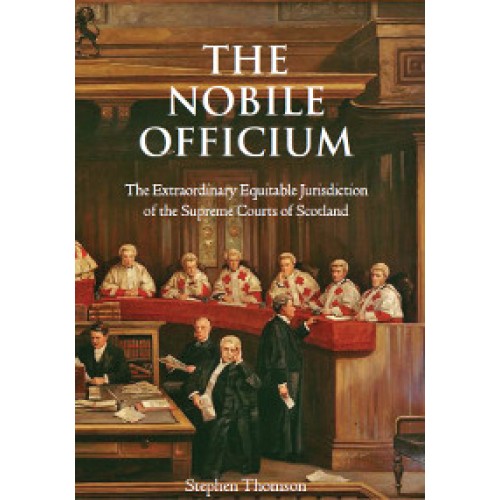
If any proof was needed that Brexit is all-pervasive, it is that the nobile officium took centre stage for a fraught few weeks in the Brexit saga this Autumn. The nobile officium is the extraordinary equitable jurisdiction of the Supreme Courts of Scotland to award any remedy they see fit in a miscellaneous range of technically narrow situations. Though it is a highly versatile judicial power, it is rarely used and there are good reasons for that. It had previously been regarded as obscure, and few people had even heard of it, but that was all set to change with Brexit.
As Theresa May’s time in office came to a premature end due to her repeated failure to obtain parliamentary approval for her negotiated withdrawal agreement with the European Union, Boris Johnson succeeded her as both leader of the Conservative Party and Prime Minister. The UK was scheduled to leave the EU on 31 October 2019 following two previous extensions agreed to by the European Council. The spectre of a further extension loomed large, but Johnson was adamant: the UK would leave the EU on 31 October “come what may, do or die”. He consolidated his position with a series of firm commitments to leave the EU on that date.
The UK Parliament enacted, in that context, the European Union (Withdrawal) (No 2) Act 2019, often known as the “Benn Act” (it was introduced to the House of Commons by Hilary Benn MP) and less endearingly referred to by Johnson as the “Surrender Act”. This effectively required that unless alternative conditions were met – namely parliamentary approval of a negotiated withdrawal agreement, or parliamentary approval for the UK to leave the EU without such an agreement – then the Prime Minister must, no later than 19 October 2019, seek to obtain from the European Council a further extension to the date of the UK’s departure from the EU. Unusually, the text of the letter that the Prime Minister must send was included in a Schedule to the Act.
Concerned that Johnson did not intend to fulfil his legal obligation to send that letter, should the statutory conditions requiring it to be sent be fulfilled, Dale Vince, Jolyon Maugham QC and Joanna Cherry QC MP submitted a petition to the nobile officium of the Court of Session. This sought, among other things, that should Johnson fail to sign and send the extension letter to the European Council, if he was required to send it by the Act, then the Court should authorise its Clerk of Court to sign and send it on his behalf; the Clerk’s signature being legally as good as the Prime Minister’s in that event.
This is not as fanciful an application of the Court’s jurisdiction as it may sound. There were a handful of cases in the 20th century where the Court used the nobile officium to authorise its Clerk of Court to sign a document on behalf of the rightful signatory who either could not or would not sign it, but was under a legal obligation to do so. This typically occurred in property disposition and bankruptcy situations. The idea in those cases was that a person who is legally required to sign a document, but refuses or is unable to do so, cannot be permitted to obstruct a legal process through such recalcitrance. It may be thought that the court could simply order the person to sign it, but if they continue to refuse to do so (as happened in a couple of the previous cases), although they might find themselves in contempt of court, the document that needs to be signed remains unsigned. The nobile officium was therefore used to plug the gap by authorising a court official to sign the document and the court deeming that signature to be equivalent to that of the rightful signatory.
Although the nobile officium had never been used to sign and send a document in place of a Prime Minister to formally request an extension on behalf of the UK under a provision in an international treaty, the parallel of principle is clear. The Court’s initial response in the Vince case was to “wait and see”: if Johnson complied with his legal obligations – and that had yet to be determined – then there would be no need for the Court to act. As events unfolded, Johnson eventually sent the letter (or rather an unsigned copy thereof) to the European Council, putatively fulfilling his statutory obligations. Crucially, however, the Court did not rule out the petition as unmeritorious and there was a real possibility that, had Johnson acted differently and declined to sign and send the extension letter (as he repeatedly suggested), the Court would have done it on his behalf. This power is regarded as unique to the Scottish courts, with no counterpart in the courts of England, Wales and Northern Ireland, which is why the petitioners turned to Scotland to pursue their objective.
All else aside, the case launched the nobile officium from relative obscurity to a subject of global interest. There was media coverage at home and abroad, and curious inquiry into this (for most people) unheard of power of the Scottish courts. Awareness of the nobile officium had certainly been raised. This author, and Lord Hope of Craighead in the foreword to the book, have encouraged the use of the nobile officium in the right circumstances. Hitherto, there had been little knowledge of its versatile scope, even among Scots lawyers. The nobile officium of the Court of Session (and the nobile officium of the High Court of Justiciary) is no longer an obscure backwater of the legal consciousness. It is not lightly used by the courts, but when the circumstances are right, it can be the only means of obtaining a remedy. As the Vince case demonstrated, it can even be used to far-reaching effect. In fact, this case almost became one of the most spectacular in UK constitutional history.
Yet the nobile officium can be used in almost any area of law, such as contract law, trusts and succession, company law, insolvency and bankruptcy, criminal law, evidence, contempt of court, family law, human rights and compliance with statutory procedure. In the past, the nobile officium had often been treated as an afterthought, an obscure remedy about which no one really knew anything of substance. No longer should it be regarded as such: it is an important part of any lawyer’s toolkit – and not just in Scotland, as this case demonstrated.
About the author
Dr. Stephen Thomson is an Associate Professor at the School of Law, City University of Hong Kong. He is the author of Administrative Law in Hong Kong (Cambridge University Press, 2018) and The Nobile Officium: The Extraordinary Equitable Jurisdiction of the Supreme Courts of Scotland (Avizandum / Edinburgh University Press, 2015).
His work appears in leading journals such as the Harvard Journal of Law and Technology, Melbourne University Law Review, Public Law, Civil Justice Quarterly, Texas International Law Journal and the University of Pennsylvania Journal of International Law. Dr. Thomson is a Legal Adviser to the Ombudsman of Hong Kong, a member of the Constitutional Affairs and Human Rights Committee of the Law Society of Hong Kong, and an examiner on the Law Society of Hong Kong’s Overseas Lawyers Qualification Examination. He has advised the Scottish judiciary on reform of civil procedure, advised public bodies in both the UK and Hong Kong, and was recently a Herbert Smith Freehills Visitor at the Faculty of Law, University of Cambridge. He holds the degrees of LL.B. (Hons.) (First Class), LL.M. (Res.), Ph.D. and Dip.L.P. from the University of Edinburgh.





